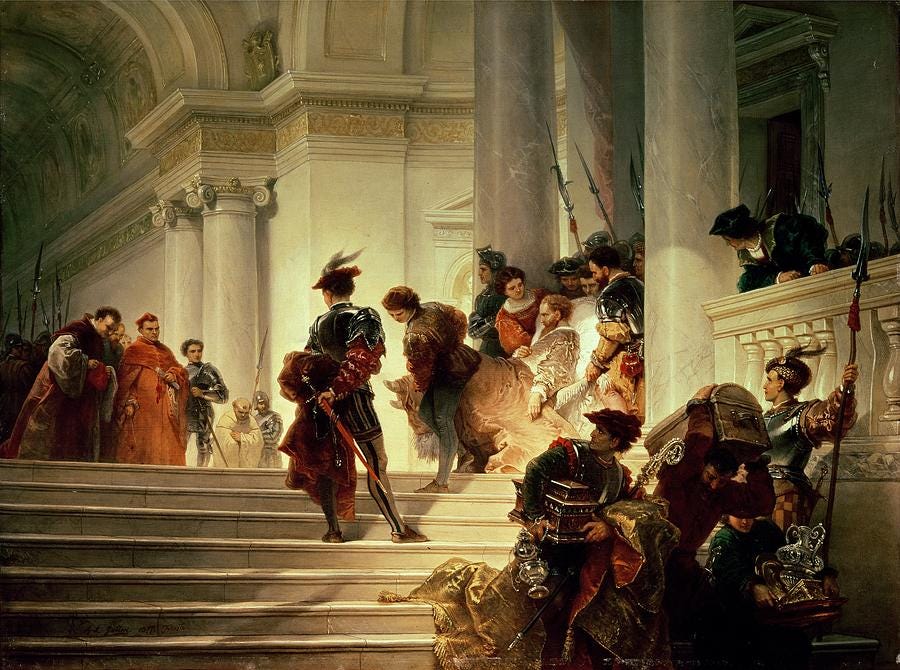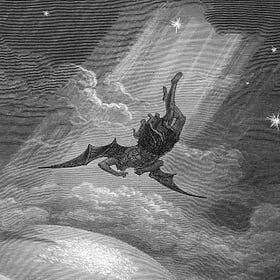Caesar Syndrome
Aut Caesar, aut nihil.
Either Caesar or nothing.
—Cesare Borgia
Son of a pope, notable member of the most powerful family of fifteenth century Europe, successful in earning military, government, and religious titles, and Machiavelli’s inspiration, reportedly had the words inscribed on his sword. Nothing could satiate his appetite for power, honors, position. While he was born into privilege, recognized and respected by other dignities, and victorious in many majestic aspirations, this inscription reveals a dissatisfaction in his quest, because his ambitions would not be quenched.
Caesar Syndrome is a striving for something greater, while dissatisfied with what is achieved. The natural motivation forces are put into overdrive: under the title of ambition, the world is not too lofty a goal. The satisfaction reward system operates in bad faith: one tells oneself “I will be happy when I achieve x”, while in reality the scope of the desires will exponentially evolve long before achievements are attained. When one is on one’s way up, there is always a next step. When one is the prince of everything, there is nowhere to go but down, and nothing to blame one’s unhappiness on besides one’s own existence. Many live with this insatiable ambition: believing that first, they are only unhappy because they have not yet reached their goals, and second, that once they reach their goals they will magically then achieve happiness. The bad faith is from the internal discrepancy between potential and actual, finite and infinite, desire and reality. One lies to themself in the belief that this discrepancy is the only reason for unhappiness, this discrepancy is resolvable, and once resolved the lack of happiness is therefore solved. Looking at most of the figures who are the subject of books and articles gives evidence that these two hypotheses do not function well together. Happiness is not suddenly realized after several decades of battle to earn it.
Unfulfilled aspirations over ambitious success is the game of life for the prince. There is always a higher position of power to strive for.
The town counsel member wants to be mayor.
The mayor wants to be governor.
The congressional representative wants to be senator.
The senator wants to be vice president.
The vice president wants to be president.
Yet even the president’s powers are limited by the constitution, fickle domestic support, and negotiations with dignitaries required to accomplish anything. Voters are easily swayed by the latest headlines and each country’s prince has their own self interested agenda to navigate. Even tyrants may confront the blade.
The etymology of syndrome is “to run together”, and while these two positions of reaching for success and unhappiness seem to logically contradict—they coexist. The mix of the two symptoms point to chronic unhappiness. The prince is a high functioning depressive, where he is capable of pursuing multiple paths towards happiness, and his outward success looks impressive, yet he will never be happy.
The ambition is pathological: the prince focuses on the unachieved result rather than process, so there is always attraction towards what is not yet materialized. The prince accomplishes goals, but by the time he reaches them, he does not care about that goal, he has moved onto a much greater one. The success should be easily enjoyed, as the fame, praise, and resources won are the envy of others. There is external beauty with discoveries of the novel, accomplishments of innovation, and unlimited energy for this adventure. One would believe that the prince, having achieved goals so desired and fought for, would be satiated, able to live in abundant luxury enjoying the command of life. But for the prince there is no satisfaction because there is potential satisfaction, unsatisfied: he continues to tell himself the next goal will be the one where he can enjoy and rest. Each win is not a win by the time he reaches it.
He has a taste for recognition from the other, since his own self recognition is bland and scarce. He can be called a genius, but this title only feeds his ego to want more, as a genius does not rest until death. The ninth symphony will be his greatest, but he is cursed without the foresight to know which achievement will be his last.
Machiavelli observed and wrote about the paranoia and strategizing that consumes those with Caesar Syndrome. Everyone is vying for the position at the top in a combination of admiration and jealousy. There is no space to enjoy the accomplishments when “the prince needs to be a fox to discover the traps and a lion to scare off the wolves”. When one is at the top, there is a paranoia that power will not last long, and a justified fear that everyone else wants one to fail so they can take the position for themself. So the ruler does not follow the advice of Han Feizi, “resting empty and reposed” in quiet foreboding power, instead remaining in fighting mode, where the greatest foe is one’s own self. Every goal must be greater.
Kierkegaard refers to this idea as despair in Sickness unto Death. Each individual has this despair as part of their being, as what one wants from life, and what one is, inevitably diverge. The self actualized is limited, finite, mortal. The self envisioned is only limited by the imagination. The discrepancies between the two lead to discontentment. The more rooted in reality one is, the less anxiety experienced, the more comfort with complacency tolerated. The more one contemplates the infinite, builds greatness in their prospective self, composes great expectations, the more they experience despair.
The contradiction between reaching success and not feeling accomplished comes from the prince’s perspective of circumstantial thinking. The ontological perspective reveals how coherent the being of the person is in this contradiction. The prince is looking for absolute power that does not exist. He can not be satisfied with himself because he is a poor little mortal human who is limited by capacity, time, resources, others, death. He reaches for divine powers but is doomed to fail. The conquest of potential and degree of achievement is an infinitely unsatisfied loop based on an illusion to become God or a denial of the limited nature of human beings. There is a desire to touch the greatest, God, through the investments in the transhuman. The ultimate ambition is to conquer death, live as a God, accomplish something so great that one’s name continues immortally, ad infinitum.
There is a little prince in each of us. Each ounce of potency we actualize gives us a taste for more. We are unsatisfied to enjoy the little potency we wield. We dream of having achievements to do as we please. We perversely think of how we would like to craft our throne, yet we have trouble mastering ourself. We resent those who do not acknowledge our ambitions and accomplishments as praiseworthy. We speak of dreams and resent our reality.
Ontological Vertigo
Vertigo is a disoriented sense of groundlessness. It literally refers to the symptom of dizziness or spinning. But the idea of panic when we are unsure of our stability grounded on something concrete metaphorically describes when we are lost. Lost in our humanity, between dogmatic…
Outrospection
When we have conflicts or problems, we try methods of introspection, which can easily move towards an examination of what is right, what is our motive, what is our purpose. We learn to question ourself because as a child we were told by our parents that we do not always get what we want, that we are sometimes in error in our…
Essence of Humanity
Recently I read Perfume: The Story of a Murderer. The main character Grenouille is born and lives without a bodily smell, without a sense of morality, with an extremely heightened sense of smell, and without a moral judgment of various smells. The author compels the reader into this universe where smell is the es…








